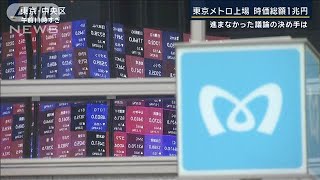TOKYO, Oct 24 (News On Japan) –
Tokyo Metro made a landmark debut on the Tokyo Stock Exchange on October 23rd, with half of its shares, previously held by the national and Tokyo governments, released to the public, creating the largest IPO since SoftBank in 2018.
The IPO soon captured the market’s attention, and within the first hour of trading, the stock opened at 1,630 yen — a 35% increase from the offering price. The company’s higher dividend yields compared to other railway companies, along with exclusive shareholder perks such as free entry to the Subway Museum and discounts at group-affiliated restaurants, helped drive interest among individual investors.
Discussions about Tokyo Metro’s listing began decades ago, tracing back to its predecessor, Teito Rapid Transit Authority, also known as Eidan Subway. In 1986, the Japanese government first signaled a move toward full privatization as part of administrative reforms. However, in 2004, when Eidan Subway transitioned into Tokyo Metro, the Tokyo Metropolitan Government opposed the company’s push for an early listing. The then-governor of Tokyo, Shintaro Ishihara, made clear his intent to keep Tokyo’s shares separate from those of the national government, as the capital sought to merge its deficit-stricken Toei Subway with Tokyo Metro. This resistance stalled progress on the listing for years.
A breakthrough came in 2021 during discussions held by a national council, which outlined plans for the listing. In tandem with the extension of the Yurakucho Line and other infrastructure projects, the national and Tokyo governments prepared for the eventual IPO. The listing finally occurred on October 23rd, with Tokyo Metro’s stock closing at 1,739 yen, giving the company a market capitalization exceeding 1 trillion yen.
Looking ahead, Tokyo Metro has several expansion projects in progress, including the extension of the Yurakucho Line from Toyosu to Sumiyoshi and the Namboku Line from Shirokane-Takanawa to Shinagawa. These projects aim to improve access and reduce congestion, particularly as inbound tourism continues to rise. The company, alongside the national and Tokyo governments, plans to continue holding half of the remaining shares to support these extensions, with a targeted opening date in the mid-2030s.
Beyond its core railway operations, Tokyo Metro plans to use the momentum from its stock listing to expand into non-railway sectors. President Akira Yamamura has expressed intentions to strengthen the company’s real estate and retail businesses, signaling a broader strategy for growth in the coming years.
Source: ANN

